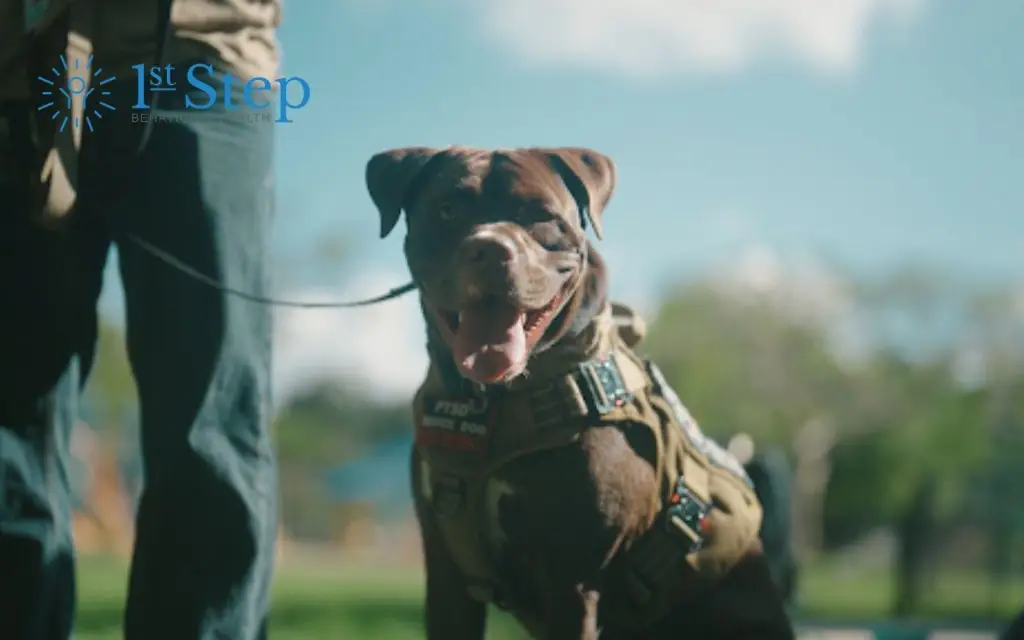Our nation’s military veterans face unique challenges in life after service. Many face a higher risk of developing substance abuse. Our veterans need compassionate, comprehensive treatment and support as they navigate substance use disorder (SUD) recovery.
Canine therapy programs can have numerous physical and mental health benefits for veterans. Veterans can access animal-assisted therapy in care facilities, community-based programs, and treatment centers like First Step Behavioral Health.
This article will explore the role of therapy animals in a veteran’s recovery journey. You will learn:
- How substance abuse impacts veterans
- How animal-assisted therapy (AAT) can benefit veterans in addiction recovery
- Where to find addiction treatment and support
If you or a loved one needs treatment for addiction or recovery support, you are not alone. Find addiction treatment and support for veterans at First Step Behavioral Health.
Substance Abuse and Veterans: Understanding the Connection
Research shows that veterans face a slightly higher than average risk of developing SUD. More than 1 in 10 veterans has an SUD. Some unique challenges veterans face during training, service, and returning to civilian life may increase this risk. These challenges include:
- Chronic pain from service-related injuries or conditions
- Traumatic brain injury (TBI)
- Unemployment and under-employment
- Homelessness
- Early access to alcohol and other addictive substances
- Chronic stress
- Post-traumatic stress disorder (PTSD)
Veterans may also face barriers when seeking treatment for drug and alcohol addiction. Generally, research suggests that about one in ten veterans lives with substance use disorder. Of these, nearly 85% will not receive the treatment they need to support recovery.
How Canine Companions Support Veterans’ Recovery
Canine companion therapy is a type of animal-assisted therapy that may benefit veterans in recovery. There are several canine-assisted therapy programs. First Step Behavioral Health partners with Semper Fi Service Dogs, a non-profit providing service dogs to veterans. Our clients can spend time with dogs during the training process as part of their treatment program.
Research shows that interacting with animals can be beneficial during recovery. The Semper Fi program provides therapy dogs to veterans living with TBI, PTSD, and other conditions related to their service. At First Step Behavioral Health, our clients can team up with pet partners during recovery to assist with training.
Spending time with dogs can be very powerful for people in recovery. It also benefits the veterans who will receive service animals after training. This element of our rehab programs can be a meaningful element of holistic treatment.
What are the Benefits of Animal-Assisted Treatment for Veterans?
Research shows that spending time with animals, including dogs, can have a range of physical and emotional benefits. It is an effective, holistic therapy for people in addiction recovery.
Here are some of the most important benefits of animal-assisted treatment for veterans.
Reduced stress
Pet therapy is proven to reduce stress. Spending even a short time interacting with an animal can reduce anxiety and tension.
Better physical health markers
Playing with, grooming, or simply sitting with a dog can lower your blood pressure and heart rate. Spending time with animals during rehab and recovery may help people improve their physical health and overall well-being.
Healthier relationships
Making and maintaining healthy relationships can be difficult for veterans in recovery. Dogs provide regular, non-judgmental affection and support. Working with dogs may help people learn how to communicate and regulate emotions more effectively. Working with dogs in this way may improve their other relationships.
A sense of safety
Having a dog around may help some veterans feel more safe and secure in an unfamiliar environment.
A positive, healing environment
Spending time with dogs can be very enjoyable. Watching them play and interact, cuddling and petting them, and training them can bring joy into a veteran’s day. Research shows that spending time with animals may reduce a person’s anxiety and boost their mood.
A purpose in recovery
Helping to train a dog for a veteran in need can help veterans in recovery feel a deep sense of pride and purpose. Finding purpose in life after military service and addiction is essential to long-term recovery.
Animal-assisted therapy can play an important role in a veteran’s recovery process. Spending time training and relaxing with dogs may help veterans feel more confident and committed to the recovery process.
Contact the First Step Behavioral Health specialists to learn more about our collaboration with Semper Fi Service dogs.
Find Treatment Now
Our country’s veterans deserve compassion, support, and effective treatment. If you or a veteran in your life needs treatment for mental health conditions or addiction, you are not alone. First Step Behavioral Health offers a range of comprehensive treatment programs for veterans and their loved ones.
Contact the intake team at First Step Behavioral Health to learn about our treatment and support programs. You may reach out at any time with questions, to verify your insurance, or to schedule an intake appointment.
References:
- National Institute of Health (NIH): Substance Use and Military Life DrugFacts
- Substance Abuse and Mental Health Services Administration (SAMHSA): 2020 National Survey on Drug Use and Health: Veteran Adults
- Science Direct: Integrating Animal-Assisted Interventions in United States Veterans With Self-Reported Posttraumatic Stress Disorder
- National Institute of Health (NIH): The study of service dogs for veterans with Post-Traumatic Stress Disorder: a scoping literature review
Jump to a Section
Call (855) 425-4846
